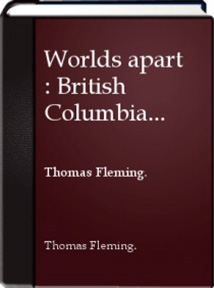Home »

Educator says BCTF intransigence played role in past disputes
‘Worlds Apart’ is the title of a book published by University of Victoria emeritus Professor of education history and policy Dr. Thomas Fleming that gives a strong indication of who may be mainly responsible for the educational anarchy now gripping B.C.
No point in beating around the bush as Dr. Fleming’s 155 page soft-cover tome published in 2011 cites a litany of intransigence by the BC Teachers’ Federation (BCTF) that appears to be playing a major role in the current educational impasse.
Dr. Fleming doesn’t hold government blameless either, but it’s abundantly clear in his extensively documented and highly readable treatise that as far back as the 1960s Canada’s most radical teachers’ union has waged a take-no-prisoners war of attrition against successive B.C. governments and wrestled educational control away from school boards and professional administrators and taken it into their own militant hands in order to impose a highly politicized and ideological agenda on students under the guise of teaching “social justice” instead of a more balanced and comprehensive education.
But don’t take my words for it; take Dr. Fleming’s. Here are some passages from near the end of his book:
 “First and foremost, the BCTF has taken upon itself the fiat of moral goodness . . . Politics and bargaining are forever intertwined in the federation’s view . . . Although the federation claims to be non-partisan, it openly and unapologetically works on behalf of the NDP and has done so since the 1960s . . . and, so, government and the federation remain imprisoned in a Catch-22 situation, consigned in effect to a twilight zone of acrimonious public relations marked by traditions of distrust and revenge on both sides.”
“First and foremost, the BCTF has taken upon itself the fiat of moral goodness . . . Politics and bargaining are forever intertwined in the federation’s view . . . Although the federation claims to be non-partisan, it openly and unapologetically works on behalf of the NDP and has done so since the 1960s . . . and, so, government and the federation remain imprisoned in a Catch-22 situation, consigned in effect to a twilight zone of acrimonious public relations marked by traditions of distrust and revenge on both sides.”
Dr. Fleming concludes by saying B.C. educational policy is “backing into the future.” He continues: “Today public education appears to be a stagnant institution, badly in need of both organizational and pedagogical rejuvenation. Even on its best days – and there are seemingly few – the public school appears to be without ideas or energy, an institution mostly preoccupied with maintaining the status quo and itself, not capable of playing an important role in the province’s economic and social development.”
Just how far the BCTF has gone down the union road as opposed to the educational can be seen by Dr. Fleming’s mention of a 2009 article in ‘Teacher Magazine,’ produced by the BCTF. In it, BCTF executive committee member and Greater Vancouver Elementary Teachers’ Association President Glen Hansman says: “The political context is the bargaining context, and the bargaining context is the political context. We cannot separate the two, and we have the obligation of trying to ensure the best climate for bargaining – not make improvements for our members and for our students.”
In all honesty, I’m not quite sure what Hansman is getting at, but whatever it is, I wouldn’t want him teaching my kid. Dr. Fleming puts it this way. “These are remarks that teachers, parents, and, indeed, the public may wish to reflect upon carefully.”
I could go on, but I think you get my drift. Yes, teachers have a valid point on class composition, which has been with us ever since special needs children were integrated into mainstream school classes 30 years ago. But I could take the BCTF much more seriously on this point if they would offer to sacrifice even one per cent of the wage increase they’re demanding to hire more specialist teachers and educational assistants which would create a much better learning environment in the classroom.
Class size, for the most part, is not an issue because class sizes in B.C. have been declining for years because of the huge enrolment drop the past two decades, which is now approaching 60,000 students.
Another issue the BCTF ignores is province-wide bargaining which they won from a friendly NDP government in the 1990s, which gives them enormous clout at the bargaining table but does little to deal with complex issues like class composition or cost of living differences around the province. Should teachers in rural B.C. be paid as much as teachers in Vancouver where house prices are in the millions? Not an easy issue to settle on a province-wide bargaining table.
But don’t let me conclude without condemning the current Liberal government for, like so many other governments before it including the NDP, dropping the ball on teacher negotiations. It’s been obvious for at least six months that the current BCTF executive has no intentions of bargaining seriously.
Premier Christy Clark even claims teachers demanded “unlimited massages” in their contract though BCTF President Jim Iker denies it. Whatever the case it must be blindingly obvious by now that nothing short of back to work legislation or binding arbitration will get the province’s half-million, ever-suffering students back in the classroom.
But does Christy have the guts, and considering all the children, the integrity to do it? We’ll see.
– Gerry Warner is a retired journalist and Cranbrook City Councillor. His opinions are his own. Dr. Fleming has written numerous books and articles on school administration and history including ‘School Days Voices from British Columbia’s Educational Past 1849-2005’ published in 2011.








